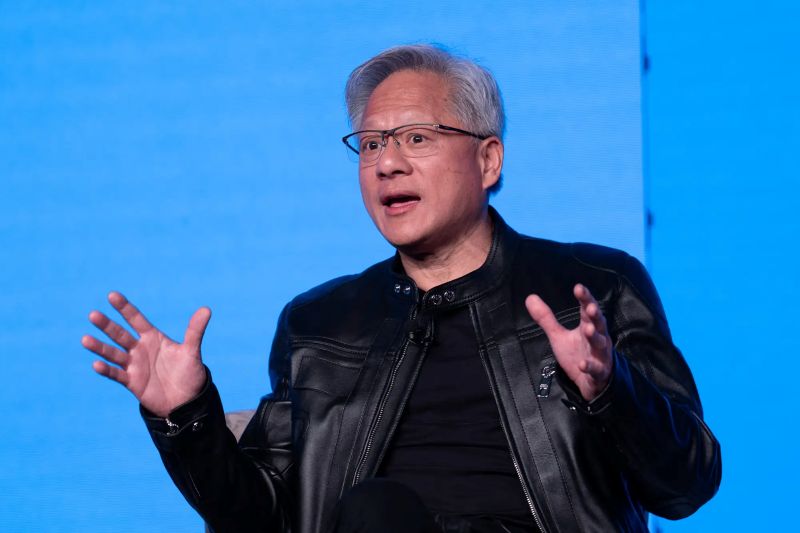Nvidia’s CEO Jensen Huang has emerged as one of the tech industry’s most influential voices regarding artificial intelligence. Recently, at events like London Tech Week, global conferences, and high-level policy forums, he has delivered a series of warnings—highlighting AI’s disruptive impact on jobs, infrastructure weaknesses in major economies, and challenges posed by geopolitical rivalries. This blog explores Huang’s key messages and their broader implications.

The Human Touch: AI as a New Programming Language
During London Tech Week, Huang described AI’s latest evolution in a striking way: “programming a person.” He explained how advanced language models allow people to instruct AI using natural human language rather than traditional coding. Huang called this shift a form of democratization:
“This new programming language is called ‘human.’ Most people don’t know C++, very few know Python, and everybody… knows human.”
He emphasized that AI has effectively removed the barrier of learning complex programming languages, calling it “the great equalizer.” This marks a pivotal moment in making technology creation accessible to everyone.
Urgent AI Job Market Warnings
Huang has repeatedly cautioned that AI’s influence on employment is not a distant risk—it’s happening now. At the Milken Institute Global Conference, he warned:
“Every job will be affected, and immediately. It is unquestionable,” and starkly added, “You’re not going to lose your job to an AI, but you’re going to lose your job to someone who uses AI.”
Rather than doom predictions, Huang frames AI as a force multiplier: those who harness AI will stay relevant, while those who don’t may be left behind. He suggests AI-driven productivity could revive millions of jobs—offering a lifeline amid disruption.
AI Infrastructure Weakness: A Global Blindspot
In London, Huang voiced concern over inadequate national AI infrastructure. While praising the UK for its talent and research, he noted:
“This is the largest AI ecosystem in the world without its own infrastructure.”
He described the UK’s ecosystem as “perfect for take-off, it’s just missing one thing,” prompting calls for urgent investment in compute capacity. Those concerns echo across geopolitics—underscoring that AI leadership demands not just talent, but robust infrastructure too.
AI Chips and Export Battles—A Sino‑American Tug‑of‑War
Geopolitical tensions further complicate the AI landscape. Huang has criticized U.S. export controls on Nvidia’s chips, particularly those aimed at China, as “deeply painful.” He warned that such policies could unintentionally boost China’s domestic AI capabilities, saying that restricting exports might embolden local innovation
Huang particularly noted:
“China is one of the world’s largest AI markets. With half of the world’s AI researchers based there… the platform that wins China is positioned to lead globally.”
He argued that export restrictions might accelerate China’s efforts to build self-sufficient AI systems, with governments and firms such as Huawei rapidly advancing homegrown alternatives .
A Call for American AI Leadership
Huang advocates for sustained U.S. investment in AI to maintain leadership, urging policymakers to avoid relying on protectionist strategies. Instead, he supports fostering strong domestic infrastructure, workforce training, and research:
“Get American AI out in front—or risk losing China AI market.”
He has also endorsed plans for domestic semiconductor manufacturing, pointing to Nvidia’s efforts to build chips and high-performance AI servers on U.S. soil .
Why Huang’s Warnings Matter
These insights from a leading AI architect carry significant weight. Here’s why:
- Policy Influence – Huang’s warnings have shaped AI investment strategies in the UK and U.S., spotlighting infrastructure and talent development.
- Industry Roadmaps – Businesses now see AI as essential to employment, supply chains, security, and competitiveness.
- Geopolitical Stakes – The U.S.–China rivalry over AI chips underscores how technology has become both competitive and strategic.
Conclusion: AI’s Double-Edged Potential
Jensen Huang’s repeated cautions reveal a nuanced view: AI offers democratizing promise, but unchecked change can disrupt jobs, national preparedness, and global power dynamics. China is racing forward; nations must not just keep up, but define the terms of leadership. Individuals must adopt AI or risk obsolescence.
His advice resonates universally:
- Workers: learn AI tools or risk being outpaced.
- Policymakers: invest in nationwide infrastructure and skills.
- Governments: strike a balance—build capacity without isolating major markets.
Nvidia’s CEO has painted a clear picture: AI isn’t a future eventuality—it’s here, reshaping every job and geopolitics in real time. The choice is clear: adapt, compete, and collaborate, or risk being left behind.


